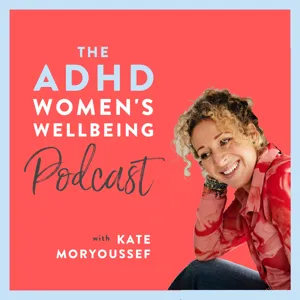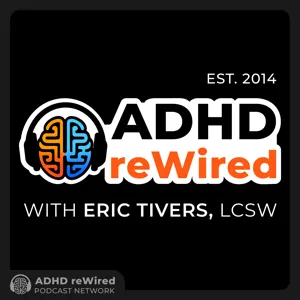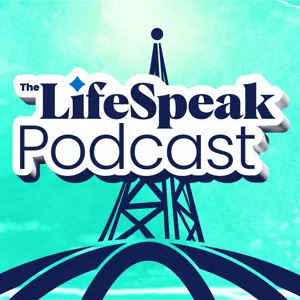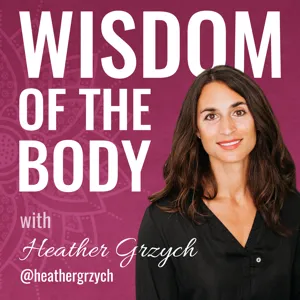Podcast Summary
Exploring the Intersection of ADHD and Hormonal Factors in Women: Dr. Lotteborg Skoglund, a Swedish researcher, focuses on the impact of sex hormones, hormonal contraceptives, and sexual risk-taking on ADHD traits and symptoms in women, advocating for increased awareness of this critical area of neurodiversity.
Dr. Lotteborg Skoglund, a Swedish associate professor in psychiatry and researcher, is shedding light on the intersection of ADHD and comorbid conditions, particularly focusing on females and hormonal factors. Despite coming from a family of psychiatrists, she was diagnosed with ADHD later in life, after having children. Her research explores how sex hormones, hormonal contraceptives, and sexual risk-taking interact with ADHD traits and symptoms. It's a crucial area of study as more attention is being given to the unique challenges faced by women with ADHD. Dr. Skoglund, who is also an author, has written a book titled "ADHD Girls to Women Getting on the Radar," and she's a strong advocate for raising awareness about this often overlooked aspect of neurodiversity.
Understanding ADHD and finding purpose in work helps prevent burnout: Having a larger purpose and taking care of lifestyle factors can help prevent burnout for those with ADHD
Having a clear understanding of ADHD and finding purpose in one's work can help prevent burnout for those with ADHD. The speaker shared her experience of receiving her diagnosis in her early thirties and since then, has been dedicated to helping others avoid the struggles she faced before. She emphasized the importance of having a larger purpose and contributing to something bigger than oneself to keep the internal drive going. Additionally, taking care of lifestyle factors such as diet, exercise, sleep, and work-life balance are crucial for ADHDers to avoid burnout. The speaker's work through Letterlife aims to help women with ADHD be more intentional in their daily lives by providing tools and resources to manage these factors effectively.
Empowering Women with ADHD: The 'Letter Life' app is designed to support women with ADHD by addressing their unique challenges in executive functioning, energy regulation, emotional control, and attention processing, through personalized features and progress tracking.
The research team behind the app "Letter Life" is dedicated to creating a tool tailored to women with ADHD, based on their unique experiences and needs. The team, made up of researchers and tech developers, identified a common theme of feeling abandoned and invalidated in their interactions with society and healthcare systems. To address this, "Letter Life" aims to provide support and resources, focusing on the executive functioning, energy regulation, emotional control, and attention processing challenges commonly experienced by women with ADHD. Through user interviews, the team gained insights into the specific needs of women with ADHD, and the app will include features to help users track their progress in managing these areas. The ultimate goal is to provide a comprehensive solution that empowers women with ADHD to better understand and manage their condition.
Understanding the impact of hormonal fluctuations on ADHD in women: Hormonal changes significantly affect women with ADHD, causing impairments in four key areas and influencing seven lifestyle factors. Acknowledging these vulnerabilities and using tools like LaterLife can lead to improved awareness and self-management.
ADHD and hormonal fluctuations can significantly impact women's lives, making it essential to understand these connections. The interview of patients revealed four areas where ADHD impairs them, along with seven lifestyle factors, all influenced by hormonal changes. This missing piece often leads to confusion and ineffective medical treatments. By adding the layer of hormonal fluctuation, women can predict and plan for challenging times, leading to improved awareness and self-management. The interactive platform, LaterLife, serves as a personalized journal for tracking these factors, acting as a research tool and source of feedback. It's crucial to acknowledge the vulnerability of women and girls during hormonal transitions such as puberty, pregnancy, post-childbirth, perimenopause, and menopause. Lettrid Life also focuses on building autonomy for teenagers, allowing them to develop self-awareness and self-efficacy while navigating their ADHD and hormonal fluctuations. The ADHD 247 model emphasizes the continuous presence of ADHD, which can be managed through medication and evidence-based multimodal interventions.
Women with ADHD find ways to navigate life despite lack of support: More research is needed, specifically involving women, to understand mechanisms behind female mental health and ADHD, acknowledging biological differences between genders, and considering menstrual cycles in studies.
Women with ADHD have been resourceful in finding ways to navigate their lives despite the lack of understanding and support from healthcare systems and research. These women have had to come up with their own "hacks" to live less exhaustingly. However, there is a need for more research, specifically research that involves women in the design and implementation to truly understand the mechanisms behind female mental health and ADHD. Current research is limited, and anecdotal evidence is prevalent. It's important to acknowledge and include the biological differences between males and females in studies to gain a more comprehensive understanding. Women's menstrual cycles should be taken into consideration when studying mental health conditions like depression, anxiety, and ADHD. By involving women in the research process and considering the unique biological differences between genders, we can move towards more accurate and effective treatments for ADHD in women.
Recognizing hormonal influences in medical decisions: Understanding hormonal factors is crucial for effective medical care. Tools like Live2Life can provide valuable data for personalized decisions, but hormonal influences are often overlooked in healthcare.
We need to acknowledge the importance of considering hormonal factors when making medical decisions, particularly for women. Currently, there's a lack of solid data and research on how hormones affect individuals, making it crucial for both patients and clinicians to have personalized information. As a psychiatrist, I make decisions based on what a patient shares in the moment, but lacking knowledge about hormonal influences can lead to flawed decision-making. The use of tools like Live2Life, which allows tracking of symptoms and everyday function across the hormonal cycle, can provide valuable data for clinicians to make informed decisions. However, in many areas of healthcare, including psychiatry, there's a disconnect between the brain and the body, and hormonal factors are often overlooked. It's essential to be aware that recommendations may not generalize to everyone and that we should prioritize personalized data to ensure effective and accurate medical care.
Women's health, hormones, and neurodivergent conditions: Collaboration between professionals from various fields can lead to better understanding and care for women's health issues, particularly for those with ADHD and hormonal fluctuations.
There is a complex interplay between women's health, hormonal fluctuations, and neurodivergent conditions like ADHD. This interconnectedness is often overlooked, and a multidisciplinary approach involving professionals from various fields, such as psychiatry, gynecology, hormone experts, and endocrinology, can lead to better understanding and care for women's health issues. The speaker, who is a psychiatrist, shares her personal experience of collaborating with a gynecologist and how their combined expertise led to new insights about the impact of ADHD on women's health and hormonal fluctuations. They found that many women struggle with tolerating hormones and contraceptives, and this can be particularly challenging for those with ADHD. By sharing stories and experiences, building a community, and pooling knowledge, we can learn from each other and gain a deeper understanding of these complex issues.
Collaboration between professionals and listening to patients leads to important healthcare discoveries: Through interdisciplinary collaboration and listening to patients, healthcare professionals can make significant discoveries that improve patient care and advance knowledge.
Effective healthcare involves collaboration between professionals and listening to patients. In this discussion, it was initially believed that hormonal contraceptives did not cause depression. However, through a decade-long research process, it was discovered that women on oral hormonal contraceptives were five times more likely to get depressed. This discovery came about through cross-professional collaboration between a psychiatrist and a gynecologist, who both learned from each other and from their patients. The importance of precision medicine and the individualized approach to healthcare was emphasized, as this case demonstrated that neither a purely psychiatric nor gynecological perspective would have been sufficient to help the woman in question. This experience highlights the significance of patients' experiences and the importance of being open to being wrong in order to advance knowledge and improve patient care. Additionally, the speaker's personal experience with ADHD and the undiagnosed cases in her family led her to create an ADHD hormone series, further underscoring the need for comprehensive and interdisciplinary healthcare approaches.
Advocate for yourself in reproductive health: Share personal experiences, collect good info, understand hormones, and be ADHD informed to optimize reproductive health.
Women should advocate for themselves when it comes to their reproductive health, especially when dealing with doctors who may not be specialized in the area. Personal experiences, such as depression and mood swings caused by hormonal contraceptives like the Mirena coil, should be shared and taken seriously. The science base for hormonal treatments is limited, making it important to collect good information and personal stories. Fluctuations in hormone levels, rather than hormone levels themselves, may be the cause of vulnerability to negative effects. Being ADHD informed and understanding one's individual ADHD profile can also help optimize hormonal stability and manage potential side effects.
ADHD and Menstrual Cycles: A Complex Interplay: Hormonal fluctuations during menstrual cycles can significantly impact women with ADHD, leading to increased anxiety and catastrophic thoughts or impulsivity. Effective treatment approaches depend on accurately distinguishing between hormonal fluctuations, anxiety, depression, and ADHD.
For women with ADHD, the hormonal fluctuations during the menstrual cycle can significantly impact their symptoms. During ovulation, when estrogen levels peak, those with anxiety traits may experience increased anxiety and catastrophic thoughts, making this period particularly challenging. On the other hand, for those without anxiety traits, the same hormonal fluctuations can lead to impulsivity. The combination of these hormonal changes and ADHD medication can sometimes result in dangerous impulsivity. It's essential to understand that every woman's experience with ADHD and menstrual cycles is unique, and not all will face the same consequences. For those struggling with PMDD (Premenstrual Dysphoric Disorder) alongside ADHD, medication such as antidepressants or antianxiety drugs may be recommended during the last two weeks of their cycle to help manage symptoms. It's crucial to distinguish between hormonal fluctuations, anxiety, depression, and ADHD to determine the most effective treatment approach. To learn more about this topic, check out Lotta's book or her organization, Letterlife. While she currently doesn't offer individual consultations, her resources can provide valuable insights for managing the complex interplay of ADHD and menstrual cycles.
Empowering Individuals with ADHD: Self-awareness, building a community, and having a team of informed professionals can help individuals with ADHD navigate various aspects of their lives. The speaker aims to make seeking help less exhausting and more efficient for the ADHD community.
The speaker is passionate about providing comprehensive support for individuals with ADHD, both as a clinician and through her project, Better Life. She emphasizes the importance of self-awareness, building a community, and having a team of ADHD-informed professionals to help individuals navigate various aspects of their lives. The speaker also expresses her desire to make the process of seeking help less exhausting and more efficient for the ADHD community. She encourages listeners to share her work and offers resources on her website. Overall, the speaker's dedication to improving the lives of individuals with ADHD is evident, and her work is empowering for both herself and those she aims to help.




